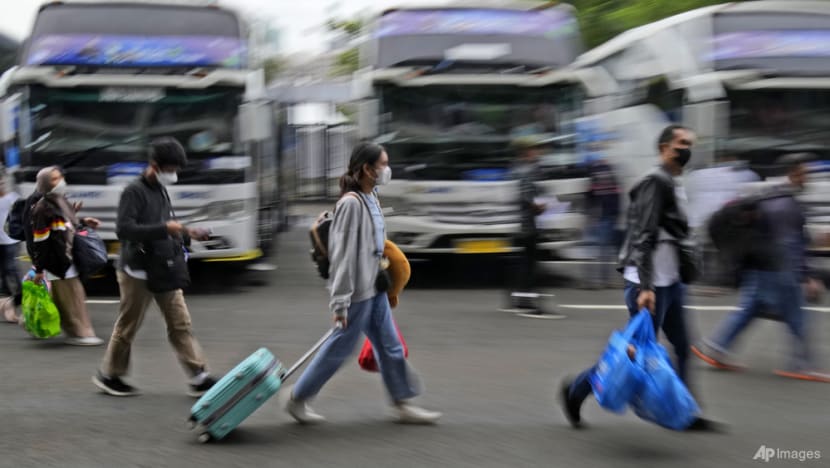After a 2-year ban, Indonesia’s mudik mass migration is in full swing again

JAKARTA: With a suitcase full of clothes and gifts for her nieces and nephews back home, Lily Hapsari travelled from Jakarta by train to her hometown in Central Java province on Monday (Apr 25) to be with her parents for the Muslim holiday Idul Fitri, which is expected to fall on May 2.
“I am so excited about going home,” the 27-year-old nurse told CNA, adding that she booked her train ride one month in advance, afraid that she would not be able to land a ticket because of surging demand.
This would be the first time in two years Hapsari spends Idul Fitri, which marks the end of the Ramadan fasting month, with her family.
For the 2020 holiday, the COVID-19 pandemic had just hit Indonesia while for 2021, health workers like her were bracing for a surge in COVID-19 cases because of the deadly Delta variant.
“I have returned (to my hometown) before (during off season) but there is something special about spending Idul Fitri at your birthplace with your parents, siblings and the rest of the extended family,” she said.
Previously, the government officially banned Indonesians from travelling to their hometowns for the 2020 and 2021 Idul Fitri. But as COVID-19 cases dwindled and more people were vaccinated, the authorities decided to allow the annual homecoming tradition, known in Indonesia as mudik, this year.
The Indonesian Transportation Ministry estimated that around 31 per cent of the population, or 85 million people will perform mudik this year because of earlier bans. In 2019, before the pandemic hit, the number of people performing mudik was around 50 million.
People’s enthusiasm has been apparent. For the past few days, airports, train stations and bus terminals have been packed with travellers eager to leave big cities like Jakarta and head to their hometowns.
Meanwhile, cars and motorcycles have been crowding intercity toll roads and streets, causing crippling congestion.
“I travelled by car because I felt safer. We are still in a pandemic after all,” mudik traveller Ghamal Kusuma told CNA. The 36-year-old banker, who travelled from Jakarta to a town in West Java, said it took him seven hours in heavy traffic for a trip that would normally take four hours.
“The traffic was awful. But I don’t mind. It’s better than using public transportation and being around with many people,” he said.
With such increase in mobility and interaction, experts are worried that it will lead to another spike in the number of COVID-19 cases.
CAUTION AGAINST COMPLACENCY
Indonesia, the world’s most populous Muslim majority nation, has not only allowed people to perform mudik but also relaxed a number of restrictions including scrapping the negative testing travel requirement for those who have received their booster shots.
The government has also allowed mosques to stage the tarawih, a night time Muslim prayer which is performed during Ramadan, as well as Idul Fitri prayers which can attract thousands of worshippers.
Indonesians are also permitted to host family gatherings at homes and spend the holidays at recreational areas during this year’s Idul Fitri as crowd restrictions are virtually repealed.
Dhanasari Vidiawati, a lecturer at University of Indonesia’s medicine faculty is worried people will become complacent with so many relaxations in place.
“The pandemic is not over. People need to remain vigilant and refrain from conducting activities and visiting places with high risk of infection. People need to assume others close to you are potential (COVID-19) carriers, especially since negative testing is no longer a requirement (for various activities),” she said.
Dicky Budiman, an epidemiologist from Australia’s Griffith University said Indonesia could see a rise in the number of COVID-19 cases particularly two to four weeks after Idul Fitri.
“The government should have kept some of the travel restrictions in place to make sure only those who are healthy are travelling. The government should also create more vaccination centres in these mudik destinations so people are better protected,” he told CNA.
“If we don’t mitigate the increase of activity and mobility well, there will be an increase in the number of confirmed cases particularly around two to four weeks after Idul Fitri.”
In 2020, the number of COVID-19 cases rose by up to 200 per cent one month after Idul Fitri. In 2021, the caseload grew by 150 per cent a month after the holidays and continued to spike for another two months.
Nadia Tarmizi, the government’s spokeswoman for COVID-19 mitigation efforts also predicted that there would be an influx of cases but said the government expects the rise to be minimal this time round.
“Last year, the number of cases rose because of (the) Delta (variant) which is exacerbated by the increased mobilities and activities seen during Idul Fitri. But this time, we don’t have a new variant that is of high concern and hopefully there won’t be,” she said in response to CNA’s queries.
CAUSE FOR CONCERN
Experts are also highlighting Indonesia’s lagging vaccination drive as a cause for concern.
Around 232 million people in Indonesia are over six years old and thus eligible to be vaccinated against COVID-19.
However, as of Apr 28, there are around 67 million Indonesians over the age of six who have not been fully vaccinated. Of this figure, more than 32 million have not been inoculated at all.
“During the mudik season, people will essentially be moving from highly vaccinated areas in big cities to low vaccinated areas in small towns and villages,” Budiman, the epidemiologist said.
Wiku Adisasmito, a spokesman for the government’s COVID-19 Task Force, admitted that vaccination is still a problem.
“(Indonesia’s) national vaccination rate is good but it is not well distributed,” Adisasmito told a press conference on Wednesday.
The spokesman highlighted that places like Jakarta already have more than 90 per cent of its population completely vaccinated against COVID-19. But there are also provinces like Papua and Maluku which have less than 50 per cent of its population completely vaccinated.
“We will push these provinces to expedite their vaccination drives, particularly those which are mudik destinations,” he said.
Pompini Agustina, a clinical pathologist at Sulianti Saroso Hospital for Infectious Disease is worried about family gatherings associated with Idul Fitri in Indonesia.
“It is important that people don’t get complacent and observe health protocols, even when we are already vaccinated. Idul Fitri is a time when we meet the elderly members of our family, unvaccinated children, people with comorbidity, pregnant women and other vulnerable groups,” she said.
“Young people might not realise that they have contracted COVID-19 because they exhibited no symptoms and they go on a mudik trip, gather during Idul Fitri and pass the disease on to these vulnerable groups.”
Adisasmito said the government has issued a number of recommendations to Muslims looking to perform mudik and celebrate Idul Fitri in their hometowns.
These recommendations include maintaining safe distancing, minimising physical contacts during family gatherings and advising the elderly not to go to crowded areas.
“We all must increase our vigilance so mudik and Idul Fitri can be done safely,” he said.
BOOKMARK THIS: Our comprehensive coverage of the COVID-19 pandemic and its developments
Download our app or subscribe to our Telegram channel for the latest updates on the coronavirus pandemic: https://cna.asia/telegram















